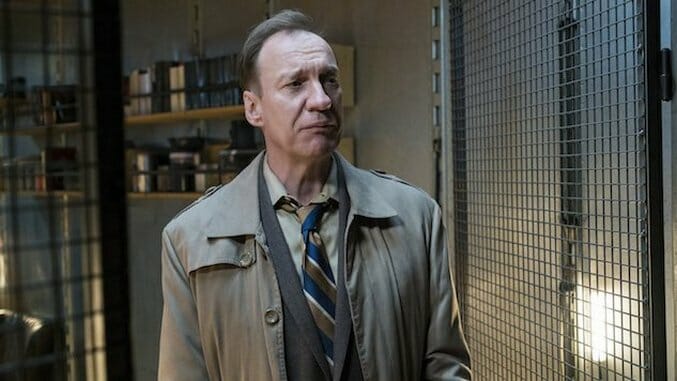Fargo: Things of Consequence
(Episode 3.06)
Chris Large/FX
There’s a turning point in every frayed relationship where, no matter how many gestures of good faith and attempts to bury past mistakes are made, there’s just no turning back. Fargo’s third season is a web of relationships that rely on increasingly strained dynamics to continue pushing forward, if they can at all. There’s V.M. Varga (David Thewlis) forcing his way into Stussy Lots and the lives of Sy (Michale Stuhlbarg) and Emmit (Ewan McGregor), punishing them for their careless financing with his continuous menacing presence. There’s also Chief Moe (Shea Whigham), the thorn in Gloria’s (Carrie Coon) side that can’t be removed, placed there by a higher power that she doesn’t have access to or sway over—not unlike Emmit, one might add. Then there’s Ray (Ewan McGregor) and Emmit Stussy, a relationship built on blood that ultimately ends in it, too; a relationship past the point of no return.
What’s fascinating and agonizing about Ray’s death in this week’s episode is that, outside of perhaps Ennis Stussy and his unfortunate demise, it’s the one that could have been prevented. If Nikki, Sy, Emmit or Ray found themselves at the mortal mercy of Varga or his henchmen, there’d be some semblance of sense there. After all, you don’t get wrapped up in murder and laundering with the mob without expecting some sort of consequences. And yet, Ray’s death comes at the hands of his brother. It’s quick, but hardly painless, a shard of glass slicing Ray’s throat and blood pooling on the carpet while his brother looks on in horror. An accident, yes, but as Varga points out, “things of consequence rarely happen by accident.”
It may be the first true thing he’s said all season. Emmit may not have purposely killed his brother, but long ago their feud reached a tipping point and neither of them did much to bring it back. Here, Emmit finally extends the olive branch, trying to give his brother the rare stamp he’s long viewed as a symbol of Emmit’s superiority and success. What Emmit doesn’t understand, though, is that it’s too late. “It’s enough,” he says about their feud, but it’s too little, too late. The bad blood runs deeper than the stamp, the fake sex tape and the botched robbery. It’s about a lack of respect that spans decades. Varga, his henchmen, and the beating they put on Nikki only compounds the pain and feelings of inadequacy, making it impossible for Ray to accept the stamp, leading to one final sibling confrontation that takes a deadly turn.
In some ways, Fargo seems to suggest that Ray’s death is inevitable, the result of a collision of forces that couldn’t be stopped. When feuds are allowed to simmer for decades, they eventually boil over. All a feud needs is a catalyst to move from the kind of disagreement that can be attributed to “brothers, and all that” to one where an organized crime syndicate is in charge of cleaning up the bloody mess. That slippery slope provides some insight into Emmit’s character. He may not reach Varga levels of evil, by any means, but his lack of self-awareness is proven to be nearly as dangerous. When he shows up at his brother’s apartment to bury the hatchet, he starts out by saying he can’t think of a single person that doesn’t like him. When Ray balks at that, Emmit doubles down, saying that he’s a fair main who people genuinely like.
-

-

-

-

-

-

-

-

-

-

-

-

-

-

-

-

-

-

-

-

-

-

-

-

-

-

-

-

-

-

-

-

-

-

-

-

-

-

-

-








































